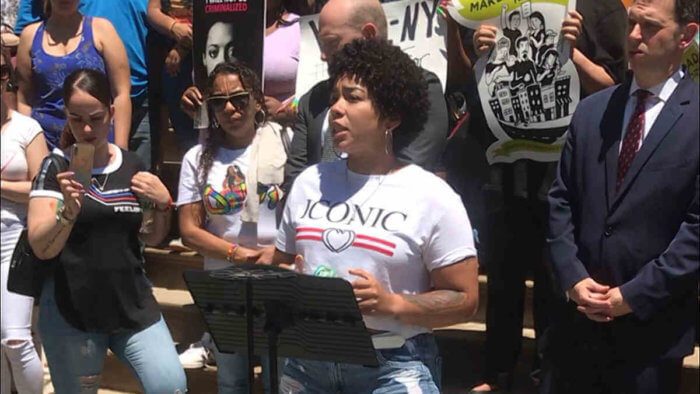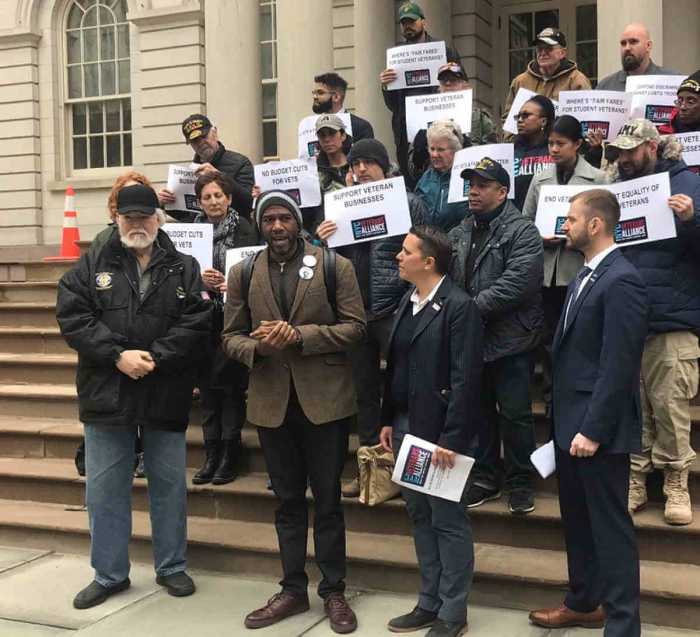Bronx District Attorney Darcel Clark announced she will not pursue criminal charges in connection with the death of Layleen Xtravaganza Cubilette-Polanco, a transgender woman who died in custody at Rikers last June — and then the borough’s top prosecutor shockingly deadnamed her in a press release announcing the news.
Clark’s office wrapped up a six-month investigation into the circumstances surrounding the death of Polanco, who died in “restrictive housing” — a version of solitary confinement — at Rikers Island on June 6, 2019, due to seizures caused by epilepsy, despite jail officials having been informed of her health conditions.
Victim’s family attorney questions investigations into a transgender woman’s fatal seizures at Rikers
Clark’s statement carefully delineated the limits of what her office looked into in its investigation of Polanco’s death, saying that “the purview of this office is not to determine whether it was a wrong decision to place Ms. Polanco into Punitive Segregation while she was suffering from a documented seizure disorder; the purview of this Office is to determine whether that decision rose to the level of criminal behavior.”
In the same press release, Department of Investigation (DOI) Commissioner Margaret Garnett asserted in a written statement that her team of investigators worked with the Bronx DA’s office to “closely” examine “all the facts” but “found no evidence of criminal wrongdoing.” However, she acknowledged that correction officers failed to follow a Department of Correction (DOC) directive stipulating that every inmate in punitive segregation be checked once every 15 minutes.
Attorney David Shanies, who represents Polanco’s family and filed a federal civil rights lawsuit in response to her death, questioned the investigations and reiterated to Gay City News that Rikers officials knew Polanco was epileptic and had multiple seizures in the recent past leading up to her death.
“One detail you can find buried in the Department of Investigation’s report is that on May 24, a doctor warned officials that Layleen could not be placed in solitary because of her epilepsy,” Shaines said in an email following the Bronx DA’s announcement. “The DOI report says nothing about that fact, and the DA’s report does not even mention it. That tells you everything you need to know about these so-called ‘investigations.’”

DOC officials discovered Polanco unconscious in her cell at 2:40 p.m. on the day she died, and Shanies later told Gay City News that the decision to place her in punitive segregation despite her health condition “became her death warrant.”
Shanies did not directly specify how or whether the results of theseinvestigations into Polanco’s death might impact the family’s federal civil rights lawsuit.
On July 30 of last year, the Office of the Chief Medical Examiner classified Polanco died as “natural” and a “sudden unexplained death in epilepsy (SUDEP) due to or as a consequence of mutation in CACNA1H gene.” Chief Medical Examiner Barbara Sampson told Gay City News in a written statement at the time that genetic testing showed a “biological mutation in the CANNA1H gene which is the likely cause of her epilepsy; variants in this gene are associated with seizures.”
The DA’s June 5 announcement came nearly one year to the day after Polanco died, and the decision to deadname Polanco represented another example of Clark’s problematic approach toward the queer community just months after her office took an extraordinarily aggressive approach in prosecuting bullied gay youth Abel Cedeno, who is now serving a 14-year prison sentence for a manslaughter conviction in the fatal stabbing of a fellow high school student in a classroom rumble.
Polanco’s death in DOC custody came less than two months after Kawaski Trawick, an LGBTQ Black man, was killed by NYPD officers at his Bronx apartment in a case where advocates said the man’s volatile behavior likely resulted from emotional distress. Cops who arrived at his apartment claimed they shot him after he “charged at the officers from a short distance” while holding a knife and a broomstick, but NYPD officials dodged questions from Gay City News at the time. Public Advocate Jumaane Williams, who was one of only a few people to view NYPD body camera footage of the moments leading up to Trawick’s death, told Gay City News last year that “it was quite clear that they had every opportunity to come out of that house and instead they stayed in.”
Clark did not return Gay City News’ calls seeking comment and answers to questions about why she deadnamed Polanco at one point in the press release. Attempts to reach members of Polanco’s family for comment were unsuccessful.
To sign up for the Gay City News email newsletter, visit gaycitynews.com/newsletter.





































